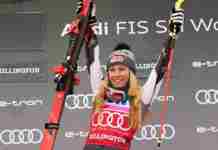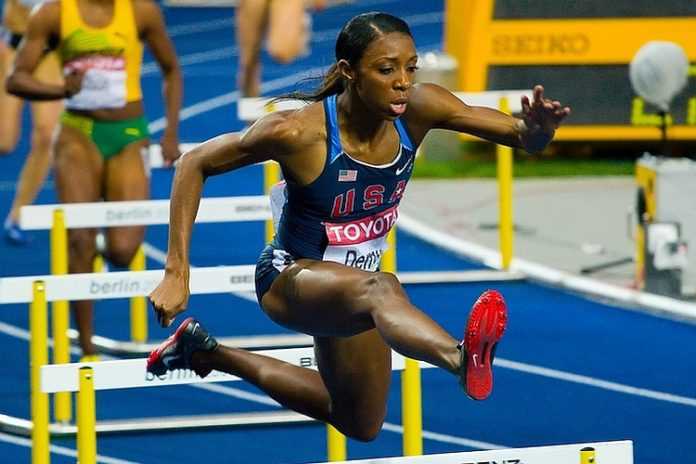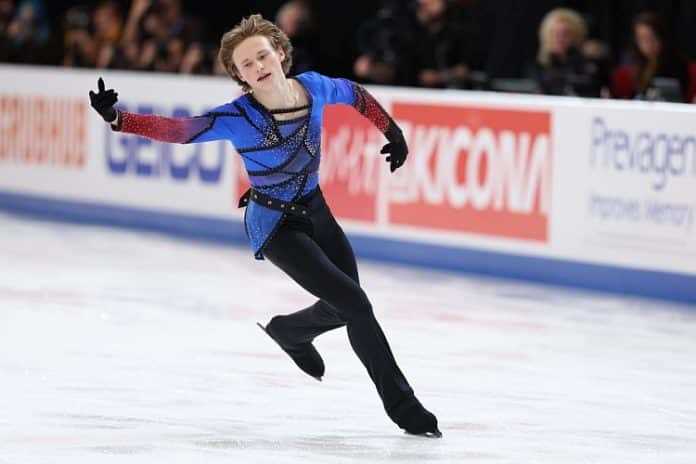★ The Sports Examiner: Surveying, monitoring and explaining the key competitive, economic and political forces shaping elite sport and the Olympic Movement. ★
★ Want TheSportsExaminer.com insights for your team? Yes! Click here for info on speaking, research and consulting from editor Rich Perelman. ★
★ To get our new, exclusive 951-event International Sports Calendar
for 2022-23 and beyond, click here! ★
★ To get The Sports Examiner by e-mail: sign up here! ★
≡ THE 5-RING CIRCUS ≡
1. Russian Antyukh disqualified for doping, with U.S.’s Demus in line for gold
2. Jones leads U.S. women’s Worlds gymnastics squad
3. FIFA sells 2023 Women’s World Cup rights in 28 European countries
4. What does it mean to be an IOC member?
5. Pentathlon fed promotes its athlete view, but is everyone actually off-topic?
London 2012 women’s 400 m hurdles gold medalist Natalia Antyukh was found to be doping during the Games period and was disqualified by the Russian Anti-Doping Agency and if confirmed, would elevate American Lashinda Demus to Olympic Champion. USA Gymnastics named its 2022 World Championships women’s team, led by national All-Around champ Shilese Jones and including Olympic veterans Jade Carey and Jordan Chiles. After complaining about the television rights offers from the larger European nations for the 2023 FIFA Women’s World Cup, the federation announced the sale of rights to 28 smaller European countries on Monday. France’s David Lappartient, the head of the International Cycling Federation (UCI) said in an interview that being a member of the International Olympic Committee gives him access to data he would not otherwise be able to access, even as the head of a major federation. The Union Internationale de Pentathlon Moderne (UIPM) circulated a declaration of its own Athletes Commission in favor of obstacle-course racing as the replacement for riding, but is the fight over the fifth discipline actually missing the IOC’s core issues concerning the sport’s Olympic future?
1.
Russian Antyukh disqualified for doping, with U.S.’s Demus in line for gold
Yet another Russian doping positive from the 2012 London Olympic Games has been announced by the Athletics Integrity Unit, this time in a tweet:
“Following AIU charges based on LIMS data, Russian athlete Natalia Antyukh has been banned for the use of a Prohibited Substance/Method. DQ results from 15 July 2012 until 29 June 2013.”
The decision was actually made by the Russian Anti-Doping Agency, which informed the AIU.
Antyukh was the gold medalist in the 400 m hurdles, running the fastest times in the heats, semis and then taking over the final in mid-race from American Lashinda Demus and winning in a lifetime best of 52.70, moving Antyukh to no. 6 all-time. Demus, the 2011 World Champion in the event, was second in a seasonal best of 52.77.
The AIU announcement refers to the information provided to the World Anti-Doping Agency (and passed on to the AIU and the relevant national federations) from the infamous “Laboratory Information Management System” (LIMS) of the Moscow Laboratory of the Russian Anti-Doping Agency, headquarters of the state-sponsored doping program from 2011-15.
Antyukh was previously held to be doping in 2013 in a Court of Arbitration for Sport decision announced in April 2021. Her results from 30 June 2013 to 31 December 2015 were nullified and she did not compete internationally after June 2014; she is still banned through 6 April 2025.
The new doping charge, which can be appealed to the Court of Arbitration for Sport, extends the period of nullified results back to 15 July 2012 and includes the London Games, where the women’s 400 m hurdles were held from 5-8 August. Antyukh’s lifetime best will move back to 52.92 from 2010.
If the RUSADA decision is endorsed by the International Olympic Committee, Demus will become the London 2012 gold medalist, with Zuzana Hejnova (CZE: 53.88) moving up to silver and Jamaican Kaliese Spencer taking the bronze (53.66). Hejnova went on to win the World Championships golds in the event in 2013 and 2015.
If Demus, now 39, is declared the London 2012 winner, it will give her an Olympic gold to go with her 2011 Worlds gold, Worlds silvers in 2005 and 2009 and a bronze in 2013. She made the U.S. Olympic team in the 400 m hurdles in 2004 in Athens, but did not progress beyond the semifinals.
Reuters reported that the Antyukh disqualification is the ninth doping sanction against Russian medalists in track & field at London 2012 (there were many others who did not medal). Previous disqualifications include Mariya Savinova (women’s 800 m gold), Olga Kaniskina (20 km walk gold), Svetlana Shkolina (high jump bronze), Darya Pishchalnikova (discus bronze), Tatyana Lysenko (hammer gold) and Tatyana Chernova (heptathlon bronze), and men’s medal winners Sergey Kirdyapkin (50 km walk gold) and Ivan Ukhov (high jump gold).
2.
Jones leads U.S. women’s Worlds gymnastics squad
The USA Gymnastics women’s squad for the FIG World Artistic Championships in Liverpool (GBR) starting on the 29th was finally determined in a closed camp setting in Katy, Texas over the weekend, with plenty of familiar faces:
● Skye Blakely, Pan Am Championships 2022 All-Around bronze; U.S. Nationals 2022 All-Around sixth.
● Jade Carey, Tokyo Olympic champ on Floor, eighth in the All-Around and on Vault; 2019 Worlds Team gold and Vault silver; 2017 Worlds silvers on Vault and Floor.
● Jordan Chiles, Tokyo Olympic Team silver; 2017 U.S. Nationals All-Around silver, third in 2021 and 2022.
● Shilese Jones, 2022 Nationals All-Around silver medalist and winner on Uneven Bars and Floor Exercise.
● Leanne Wong, 2021 Worlds All-Around silver, Floor Exercise bronze and fourth on Beam; 2019 Pan Am Games Team gold.
Lexi Zeiss, 16, will be the traveling alternate; she was seventh at the U.S. Nationals All-Around.
During the Friday All-Around competition, Jones was the winner at 56.700, followed by Chiles (56.100), Carey (55.450), Blakely (54.650) and Wong (53.250). Jones won the Vault (14.500) and Uneven Bars (14.500), Carey won on Beam (13.750) and Chiles took the Floor Exercise at 14.250.
Only three events were held on Saturday, with Jones scoring 14.600 to win on the Uneven Bars. Blakely led on Beam (14.550) and Addison Fatta was tops on Floor Exercise (13.700).
The Liverpool squad has some experience, with Carey and Wong having competed at the Worlds previously and Chiles and Carey both members of the Tokyo Olympic team.
3.
FIFA sells 2023 Women’s World Cup rights in 28 European countries
Just days after FIFA’s Chief Business Officer Romy Gai (ITA) reported refusing broadcast rights offers from major European countries for the 32-nation 2023 FIFA Women’s World Cup, the federation announced a deal with 28 European countries with the European Broadcasting Union on behalf of free-to-air public broadcasting companies in:
Albania, Austria, Belgium, Bosnia & Herzegovina, Bulgaria, Croatia, Cyprus, Czech Republic, Estonia, Georgia, Hungary, Iceland, Ireland, Kosovo, Latvia, Liechtenstein, Lithuania, Luxembourg, Malta, Moldova, Montenegro, North Macedonia, Romania, Serbia, Slovakia, Slovenia, Switzerland and Turkey.
That’s 28 of the 55 members of the European football federation UEFA; of these, only Ireland and Switzerland are qualified for the tournament. The deal does not cover 15 major federations, including nine qualifiers and one in a playoff for a spot:
● Denmark (qualified)
● England (qualified)
● Finland
● France (qualified)
● Germany (qualified)
● Greece
● Italy (qualified)
● The Netherlands (qualified)
● Norway (qualified)
● Poland
● Portugal (in playoff)
● Scotland
● Spain (qualified)
● Sweden (qualified)
● Wales
In addition, there are 12 smaller or troubled markets also remaining for rights sales, including Andorra, Armenia, Azerbaijan, Belarus, Faroe Islands, Gibraltar, Israel, Kazakhstan, Northern Ireland, Russia, San Marino, and Ukraine.
FIFA President Gianni Infantino (SUI) told reporters at the Women’s World Cup Draw over the weekend that the event could cost $400 million (U.S.) to stage and he hopes the federation will break even.
The tournament, being held in Australia and New Zealand kicks off on 20 July 2023. Negotiations with the large European broadcasters are complicated by the time difference: Paris is nine hours behind Sydney and 11 hours behind Auckland, so night games will kick off before noon in central Europe and day games will be seen in the wee hours of the morning. Although unavoidable, that won’t help with viewership.
4.
What does it mean to be an IOC member?
The French-language FrancsJeux.com site asked David Lappartient (FRA), the President of the Union Cycliste Internationale, what it actually means to be a member of the International Olympic Committee, in many ways a smaller role than being the head of a large international federation.
Just elected at the Beijing Winter Games Session in 2022, Lappartient said:
“I knew the IOC, I attended the Sessions in my capacity as president of the UCI. Becoming a Member allows you to be better recognized, to really feel like you belong to this big family.
“For the rest, the difference is not very great, except that I can now express myself, I have access to documents and information which are not available to the presidents of International Federations. Since my election last February, there has not been a new Session. But my membership of the IOC comes with new positions in the Olympic movement: I am a member of the board of directors of the [French National Olympic Committee] and I sit on the board of directors of the Paris 2024 [organizing committee].”
Asked about his role as an IOC member and UCI chief:
“I feel very concerned by the development of the values conveyed by sport, and everything that can be done through these values, especially today in Afghanistan and Ukraine. Ultimately, the Games are only a tool at the service of this ideal. They were designed with this in mind. I also like diplomacy through sport. At the UCI, we were leaders in the international effort to evacuate athletes and officials from Afghanistan after the Taliban took over Kabul. We have succeeded where the political world had failed.”
And as for carrying the flag of the UCI?
“[Y]ou don’t join the IOC to defend your sport or your international federation. We do it to carry our values.”
5.
Pentathlon fed promotes its athlete view,
but is everyone actually off-topic?
With the Olympic future of a sport not presently on the program of the Games of the XXXIV Olympiad in Los Angeles in 2028 hanging in the balance, the back-and-forth between the Union Internationale de Penathlon Moderne (UIPM) and the Pentathlon United athlete group continues.
In response to Pent United’s announcement of multiple motions for the forthcoming UIPM Congress on 11-12 November, the federation distributed a statement by its Athletes Commission, calling for acquiescence to the replacement of riding with obstacle course as a fifth discipline, to go along with fencing, swimming and the laser-run combo of shooting and running.
It included:
● “In December 2021, the UIPM Athletes Committee had a meeting with senior decision-makers from the International Olympic Committee. We were told, in no uncertain terms, that if the Modern Pentathlon format proposed for the Los Angeles 2028 Olympic Games included Riding, it would not be successful – and we all know what exclusion from the Olympics would mean for our sport.”
● “[W]e have unanimously reached the conclusion that Obstacle Discipline is the only way forward for Modern Pentathlon. Not only that, we believe it can be much more than a source of salvation, and actually can transform the global popularity, accessibility and commercial appeal of our sport.”
● “We will all miss our Riding discipline when it is consigned to the past, but we urge all athletes who care about the future of Modern Pentathlon to move forward, embrace change and stand together to seize the unique opportunity now in front of us.”
● “Today, with leading pentathletes from around the world declaring solidarity with the Athletes Committee’s stance, we launch a new movement entitled #OurFuture.
“#OurFuture gives a voice to athletes who may not have felt comfortable revealing their true feelings, or even joining a conversation about the pros and cons of the change, because of the negativity expressed in some quarters. We will continue to listen to all opinions, but we cannot let negativity become the reason we fail to save our beloved sport.”
The frothy point-counterpoint argument between the UIPM and Pent United may be unbecoming, but it’s quite real and deeply felt within the sport. And it isn’t going away.
Observed: The UIPM Athletes Commission statement simply mirrors what the federation’s leadership has been saying: if riding is maintained, modern pentathlon is off the Olympic program.
The back-and-forth between the UIPM and the Pent United group obscures the IOC’s instructions to “demonstrate a significant reduction in cost and complexity and an improvement across the areas of safety, accessibility, universality and appeal for young people and the general public.”
There are arguments to be made on retaining riding and for changing to obstacle. Riding is accessible, as shown by the presence of equestrian in the Olympic Games, with 137 national federation members. Obstacle courses seem easier to install, but the sport at the international level is so small that it isn’t even a “recognized sport” by the IOC and wasn’t even included in the 2022 World Games – the showcase for could-be-Olympic sports – held in Birmingham, Alabama this summer. But is this the IOC’s fault?; more on this below.
Critically, the continuing argument over riding vs. obstacle misses the IOC’s request to know how modern pentathlon is going to improve “universality and appeal for young people and the general public.”
Translation: not many people care about this sport, so why should we bother? The riding vs. obstacle debate has completely eliminated any explanation of how a change to obstacle is going to make kids want try modern pentathlon. And UIPM Secretary General Shiny Fang (CHN) underscored the problem in a recent post, which included:
“And the hard fact is that UIPM Laser Run events have reached around 100 countries, while the full Modern Pentathlon has only reached half of them.”
While the UIPM says horse availability is an issue, why isn’t it an issue for equestrian? The two federations have almost the same number of members: 137 for the FEI and 131 for UIPM. Where’s the disconnect?
The Pent United folks contend that keeping riding in the sport maintains the format created by Olympic Movement founder Pierre de Coubertin (FRA) for the 1912 Games in Stockholm, and says the UIPM is responsible for not promoting the sport over the last 30 years or more. But, focused on the riding vs obstacle issue, it has not put forth its own promotional plan that fixes the lack-of-interest difficulty.
Is the IOC part of the problem? Back in November 2021 – before the IOC’s announcement about the 2028 program – the UIPM listed 13 criteria for a new fifth discipline which it stated “must” be met, but interestingly cited the UIPM Innovation Commission as the source of the requirements. One of them – and it’s a killer – is that the new discipline must “[n]ot fall under the governance of another IOC-recognized International Federation.” Why?
If that’s an IOC requirement, it makes little sense, as the other elements of even a revised pentathlon would include fencing, swimming and running (and maybe shooting), all governed by other IFs. Is this something that the UIPM Innovation Commission decided on, by itself?
There was wide discussion after the Tokyo Games horse-punching incident of swapping riding for cycling, which is the obvious cure to the accessibility and cost issues, but maintains the spirit of de Coubertin’s five elements from the early 20th Century. But whose requirement was it not to have an IOC-recognized federation involved?
The IOC is watching all of this and seems to hope for an insightful proposal from the UIPM. But that seems to be more of a question than anything else, heading into November’s Congress.
≡ WORLD CHAMPIONSHIPS ≡
● Curling ● Canada defeated home team Scotland to win the WCF Mixed Team Championship in Aberdeen (SCO) on Saturday.
After a 4-4 tie through four ends in the final, Canadian skip Jean-Michel Menard guided his squad to a 6-4 lead with single points in the fifth, sixth and seventh ends and the Scots conceded after the eighth. Switzerland won the bronze medal with a 6-4 win over Sweden.
It’s the third straight World title for Canada in this non-Olympic event, each with a completely different team!
● Shooting ● Team events dominated Monday’s competitions at the ISSF World Championships in Rifle and Pistol in Cairo (EGY), with China winning two golds.
China’s Ranxin Jiang and Bowen Zhang won the Mixed 50 m Pistol gold, defeating Mongolia, 17-9, and Yuehong Li, Zhiming Lu and Jueming Zhang scored a 16-6 victory over Ukraine in the men’s 25 m Team Pistol gold-medal match.
The Norwegian pair of Jenny Stene and Simon Clausson also won a 17-9 decision in the final of the Mixed 50 m Rifle/3 Positions.
≡ PANORAMA ≡
● Cycling ● The Afghan Women’s Road Championships were remarkably held on a 57 km course in and around Aigle, Switzerland on Sunday, with sisters Farima Hashimi and Yulduz Hashimi finishing 1-2, both timed in 1:32:40.
There were 50 Afghan riders, coming from countries across Europe, Canada and Singapore to race, under conditions that would have been impossible in their homeland. And the race had future implications as the Hashimi sisters were both offered a contract with the professional team Israel Premier Tech Roland for next season!
● Sport Climbing ● The new Paris 2024 event combining Boulder and Lead was tried for only the second time at the final IFSC World Cup of the 2022 season, in Morioka, Japan from 20-22 October.
Only previously tried at the European Championships, the rest of the world had an opportunity to try the new combination, as Speed will be a separate event in Paris.
Japan swept both the men’s and women’s titles, with home stars Tomoa Narasaki (three-time World Champion; 156.4), Yoshiyuki Ogata (138.4) and Kokoro Fujii (132.6) taking the medals. Japan’s Ai Mori – the 2019 Worlds bronze medalist in Lead – won the women’s event with 190.9 points to 171.2 for American Natalia Grossman and 131.8 for Korean Chae-hyun Seo. American Brooke Raboutou was fourth (126.0).
¶
You can receive our exclusive TSX Report by e-mail by clicking here. You can also refer a friend by clicking here, and can donate here to keep this site going.
For our updated, 951-event International Sports Calendar for 2022-23 and beyond, by date and by sport, click here!























